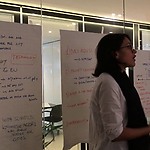Transcription of video:
First of all, we’ve drafted a tentative timeline of our brainstorm from here to our plenary.
We will be focusing on three tasks:
- Creating a better methodology for transfer networks and new research on urban challenges: The idea is to enrich our knowledge dossier: the one we received today and to focus on urban challenges that technology can solve with a scientific approach. Each will do this by itself
- To identify the most pressing local challenges in our cities that technology can solve, and what kind of applied methodology (e.g. experimental, iterative, adaptive or context-based methodologies) we can use to address these challenges and find solutions in the city
- Mapping the knowledge actors in our cities. Since we established the quintuple helix approach to urban governance, the idea is that several urban actors (public, private, communities, social organizations) are part of an urban ecosystem. We are going to identify the knowledge actors in the city that are working on urban challenges
In the next 45 days, we will have a virtual check in where we discuss our progress in the three tasks. Afterwards, we will participate in the Euro Cities webinar (Aleksandra Olejnik: information and dates on the webinar will soon follow, everybody will be welcome to contribute).
In the next plenary, we will share the results of our work and draft a methodology. We decided that we want to work on the idea of this city network being a place where cities can learn form each other through a peer review approach on what’s the best scientific approach to find the best policy solutions in the case of tech.
We realize that the EU produced an amazing amount of knowledge, but often there is a lack of opportunities for cities to learn from each other in how they are methodologically approaching these topics. We want to build a methodology for cities to do this, in cooperation with the local knowledge actors in order to overcome the lack of cooperation between these worlds.
Concludingly, we didn’t speak much about technology much because we first want to discuss the challenges that technology can solve and to reflect on our methodological approach. Then, of course, technology will be our focus for the experimentation.
